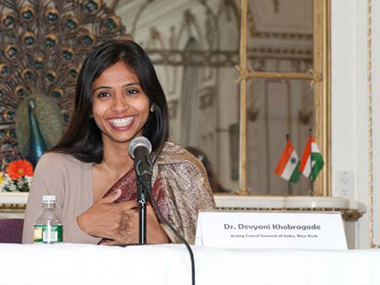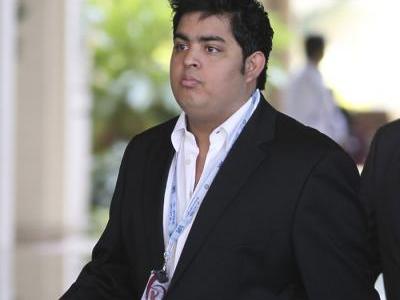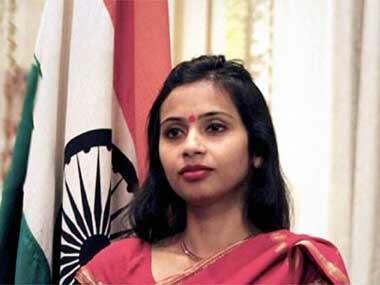Fri, 12/20/2013 - 00:22
A Tale of Two Indias
Two stories from India this week – one you’ve undoubtedly heard all about, the other, probably not.
The reason for the ubiquity of one story and a de facto media blackout of the other will be pretty clear if you stick with me for a bit.
First, the story of the Indian diplomat Devyani Khobragade, who was arrested in New York on charges of visa fraud and making false statements about how much she paid her Indian housekeeper in the US.

All hell broke loose on that one, of course. Security barricades around the US Embassy in New Delhi were taken down, anti-US protests broke out, politicians ranted, and in the end, US Secretary of State John Kerry had to issue placatory comments to soothe a wannabe great power’s injured pride.
Next, a story that’s hardly being covered by Indian news organizations – you’ll have to comb social media sites to find anything substantial on this.
“Mukesh Ambani’s son allegedly kills 2 in a car accident. Media blacks out the news #WTFnews,” read the headline of a blog posted over the weekend.
In case you didn’t know it, Mukesh Ambani is India’s richest man, according to Forbes. The 56-year-old scion of one of India’s premier business families is also ranked 37 in the 2013 Forbes list of the world’s most powerful people.
If you’re Indian and your daddy is one of the world’s most powerful people, you can get away with quite a bit – that’s fairly well-known in the world’s largest democracy.
The junior Ambani story is still a bit murky and will probably stay that way for a while, since few Indian journalists are on the job because – get this – a substantial proportion of them work for news organizations in which Ambani owns substantial stakes.
I asked a seasoned Mumbai-based business journalist to estimate how much of the Indian media is owned by Mukesh Ambani or his family.
“You mean directly owned or owned via parent companies, or other companies owned by the family?” he asked.
“All of them,” I replied. “Break it down for me.”
“I really don’t know exactly,” was the honest reply.
Take just one case: A Feb. 2012 Business Today report dubbed Ambani “the go-to man for media moguls in distress” after his Reliance Industries (RIL) substantially funded Network 18, a mega media holding group whose list of mainstream news channels include CNBC-TV18, IBN 18 (which runs CNN-IBN), Viacom (which owns MTV India and other channels) and Web18.
These are just some of the English-language news brands, not the national and regional language media. And this is just one holding company in which Ambani has substantial stakes. We’re not talking about other news media where Reliance Industries accounts for substantial ad revenues, just so you get the picture…
Now to get back to junior – or Akash Ambani: There have been reports that the young man was driving a glitzy Aston Martin Rapide early Sunday, following a Saturday night party, when it crashed in Mumbai’s upscale Peddar Road area, injuring eight people. Some reports say two people were killed, but the Mumbai police now say there were no deaths.

Witness accounts say a “fully drunk” young man bearing a strong resemblance to Akash Ambani was in the driver’s street at the time of the accident. The young man was spotted getting into one of two tailing cars and fleeing the scene.
Nevertheless, the next day – and here comes the glorious moment – a 55-year-old driver employed by Reliance presented himself at a Mumbai police station and accepted responsibility for the accident.
Just so you know, there’s a rich history of rich, drunk Indians screeching around in daddy’s cars and killing impoverished souls who live on the streets of Indian cities.
In Sept. 2002, Bollywood superstar Salman Khan ran into a bakery in a Mumbai suburb and killed a man sleeping on the pavement outside the bakery.

More than a decade later, the case is still dragging through the courts. The charges have been lowered to culpable homicide not amounting to murder, the actor’s police guard who testified that Khan was drunk at the wheel was suspended from the police force, and the saga rolls on.
In short, if the average Indian believes the rich enjoy impunity, they’re probably right.
But this is hardly unique to India.
Now let’s examine a case that’s uniquely Indian.
‘In a hold-up with common criminals’
Enter Devyani Khobragade, Indian deputy consul in New York, who was arrested last week outside her daughter’s Manhattan school.
The incident sparked a level of outrage – and diplomatic pettiness – that took Washington, who’s no stranger to anti-US clamor, by surprise.
Apparently, the shock and horror is due to the way Khobragade was treated.
In an email published by several news sites, Khobragade described her ordeal at the hands of the NYPD: “I broke down many times as the indignities of repeated handcuffing, stripping and cavity searches, swabbing, in a hold-up with common criminals and drug addicts were all being imposed upon me despite my incessant assertions of [diplomatic] immunity,'' she wrote.

Note that “hold-up with common criminals”. Khobragade is not a commoner. She’s a diplomat. She’s educated, erudite, entitled – and her daddy, Uttam Khobragade, is a top bureaucrat who has been linked to the massive Adarsh Housing scam in Mumbai, a city that ranks among the world’s 10 most expensive cities for real estate.
Indian maids are made for exploitation
If you think anyone gives a hoot about Mme. Deputy Consul’s Indian maid who was heinously underpaid (try living in New York City on a $500 monthly salary), you can just fuggedaboutit.
The maid, Sangeeta Richard, fled her employer’s place in June and approached an immigration attorney in July. Very few details are available about Richard and her whereabouts, but the Indian government and press have made a fuss of the fact that her husband was granted a US visa.
Now here’s the fun twist: the Indian employer is accused of paying an illegal wage and falsifying documents in the US. In India, her maid has been charged with cheating and conspiracy. If Richard enters India, she will be arrested.
Take that exploited Indian domestic workers who dare approach any damn NGO or immigration attorney in the US for help.
I’m very familiar with these sorts of cases, I’ve covered the lot while I was based in New York. If I have to report on these hapless stories again, I will ask these women if their employers are rich, powerful Indians with diplomatic or un-diplomatic immunity. If they are, and the exploited Indian laborer wants to return home, I will tell her, “You can just fuggedaboutit, hon.”
Encounters, taplis and police heavy-handed techniques
A word about this heavy-handed treatment by the NYPD to which the Indian diplomat was subjected…
That had me howling with laughter.
I remember waiting for an interview at a local police station in Mumbai – this was around two decades ago.
In the course of about 45 minutes, every sod entering the station got a resounding whack on the head from every low-level police constable he passed.
In Bambiya – the distinctive language of Mumbai residents – a whack is called a tapli. You can get a good natured tapli, for instance, if you’re teasing a friend.
But these were not good natured taplis. Neither did they seem targeted. They were just meted out vigorously and regularly to every unlicensed hawker, layabout, ruffian – guilty or not guilty – who happened to pass a police constable.
I didn’t get a tapli of course – and that’s not because I’m female. If I had a male colleague with me, he would have been spared too. We don’t belong to the class of Indians who get arbitrarily whacked by the police. We are part of the educated, erudite, entitled, English-speaking elite. We get to yell at the cops who hail from the lower rungs of the social ladder. Taplis from the police are reserved for the poor and downtrodden.
Mind you, this scene unfolded in the reception area of the police station. I never saw what was going on behind the closed doors at the back of the room.
But my friend, journalist Suketu Mehta, did and you can read all about the police’s horrific torture techniques in his magnificent book, Maximum City.
India has a particular feature called the “encounter” or “police encounter” or “fake encounter”. Quite simply, these are cases of alleged criminals being killed in custody. Police or security forces then report the victims were killed in a gunfight. In one Indian state alone, the National Crime Records Bureau estimated that 1,224 people died in fake encounters between 1993 and 2008. India has 28 states plus a couple of union territories – now go do the math.
Dear Ms. Khobragade, when it comes to police heavy handedness, try death in custody, sister. It’s happening to your fellow – and lesser – countrymen, and you can’t top that.
So many Indians, so many responsibilities
Earlier this week, Indian Foreign Minister Salman Khurshid was in full fulmination mode when he vowed to “bring back the woman diplomat and restore her dignity – it is my responsibility.”
Ah, you’ve got responsibilities, Mr. Khurshid. In the course of my travels and reporting missions, I’ve seen your ministry doing a pretty crap job addressing some of them.
There are, as we speak, millions of Indian laborers slogging in a number of Gulf countries under conditions that should upset you almost as much as your deputy consul’s treatment in New York did this week.
I don’t have the countrywide figures, but the UN estimates that 600,000 migrant workers are tricked and trapped into forced labor across the Middle East.
Indian migrant workers in GCC (Gulf Cooperation Council) countries are exploited under the kafala – or sponsorship – system, which prevents them from leaving employers and often involves handing over their passports.
The situation is particularly dire for migrant domestic workers – mostly women like Richard – isolated in private homes.
So, let’s have some outrage directed at various emirs and princes over the suicides by hapless low-skilled workers trapped in conditions no citizens of any country should ever have to endure.
I’ve also seen some of your foreign ministry underlings struggle to keep up with their duties in chronically understaffed, under-funded Indian embassies across the world, Mr. Minister. This does not bode well for an emerging country with global ambitions.
In some African countries, I’ve seen little battalions of Chinese embassy officials efficiently handle the workload that one poor sod in the Indian embassy’s economic section is handling tout seul. These are countries where India and China have competing economic interests and New Delhi is on the losing track, so step on that, Mr. Khurshid.
While we’re at it, your responsibilities also include providing decent citizenship services to your nationals abroad.
I once saw a grown man faint in the citizen services section of your embassy in Paris, Mr. Khurshid. The scramble of desperate people trying to reach the window was somewhat similar to the scenes at refugee camps when the food aid arrives.
The folks in the crush at the Paris consulate were almost exclusively impoverished workers – two men I spoke to had arrived from Punjab and were earning a precarious living selling trinkets near the Eiffel Tower. I didn’t spot a single Indian national of Khobragade’s – much less junior Ambani’s – social class in that melee.
In fact, I can’t imagine anyone like Khobragade putting up with that sort of treatment.
For that matter, I can’t imagine Akash Ambani has ever had to sweat it out at any Indian embassy abroad.
And for some reason, I doubt he will ever sweat it out in any tapli-administering Indian police station.
But boy, if he runs into trouble with the police in New York or any other US city, he had better be meted the special treatment that special Indians deserve wherever they travel, wherever they roam far away from home.
The reason for the ubiquity of one story and a de facto media blackout of the other will be pretty clear if you stick with me for a bit.
First, the story of the Indian diplomat Devyani Khobragade, who was arrested in New York on charges of visa fraud and making false statements about how much she paid her Indian housekeeper in the US.

All hell broke loose on that one, of course. Security barricades around the US Embassy in New Delhi were taken down, anti-US protests broke out, politicians ranted, and in the end, US Secretary of State John Kerry had to issue placatory comments to soothe a wannabe great power’s injured pride.
Next, a story that’s hardly being covered by Indian news organizations – you’ll have to comb social media sites to find anything substantial on this.
“Mukesh Ambani’s son allegedly kills 2 in a car accident. Media blacks out the news #WTFnews,” read the headline of a blog posted over the weekend.
In case you didn’t know it, Mukesh Ambani is India’s richest man, according to Forbes. The 56-year-old scion of one of India’s premier business families is also ranked 37 in the 2013 Forbes list of the world’s most powerful people.
If you’re Indian and your daddy is one of the world’s most powerful people, you can get away with quite a bit – that’s fairly well-known in the world’s largest democracy.
The junior Ambani story is still a bit murky and will probably stay that way for a while, since few Indian journalists are on the job because – get this – a substantial proportion of them work for news organizations in which Ambani owns substantial stakes.
I asked a seasoned Mumbai-based business journalist to estimate how much of the Indian media is owned by Mukesh Ambani or his family.
“You mean directly owned or owned via parent companies, or other companies owned by the family?” he asked.
“All of them,” I replied. “Break it down for me.”
“I really don’t know exactly,” was the honest reply.
Take just one case: A Feb. 2012 Business Today report dubbed Ambani “the go-to man for media moguls in distress” after his Reliance Industries (RIL) substantially funded Network 18, a mega media holding group whose list of mainstream news channels include CNBC-TV18, IBN 18 (which runs CNN-IBN), Viacom (which owns MTV India and other channels) and Web18.
These are just some of the English-language news brands, not the national and regional language media. And this is just one holding company in which Ambani has substantial stakes. We’re not talking about other news media where Reliance Industries accounts for substantial ad revenues, just so you get the picture…
Now to get back to junior – or Akash Ambani: There have been reports that the young man was driving a glitzy Aston Martin Rapide early Sunday, following a Saturday night party, when it crashed in Mumbai’s upscale Peddar Road area, injuring eight people. Some reports say two people were killed, but the Mumbai police now say there were no deaths.

Witness accounts say a “fully drunk” young man bearing a strong resemblance to Akash Ambani was in the driver’s street at the time of the accident. The young man was spotted getting into one of two tailing cars and fleeing the scene.
Nevertheless, the next day – and here comes the glorious moment – a 55-year-old driver employed by Reliance presented himself at a Mumbai police station and accepted responsibility for the accident.
Just so you know, there’s a rich history of rich, drunk Indians screeching around in daddy’s cars and killing impoverished souls who live on the streets of Indian cities.
In Sept. 2002, Bollywood superstar Salman Khan ran into a bakery in a Mumbai suburb and killed a man sleeping on the pavement outside the bakery.

More than a decade later, the case is still dragging through the courts. The charges have been lowered to culpable homicide not amounting to murder, the actor’s police guard who testified that Khan was drunk at the wheel was suspended from the police force, and the saga rolls on.
In short, if the average Indian believes the rich enjoy impunity, they’re probably right.
But this is hardly unique to India.
Now let’s examine a case that’s uniquely Indian.
‘In a hold-up with common criminals’
Enter Devyani Khobragade, Indian deputy consul in New York, who was arrested last week outside her daughter’s Manhattan school.
The incident sparked a level of outrage – and diplomatic pettiness – that took Washington, who’s no stranger to anti-US clamor, by surprise.
Apparently, the shock and horror is due to the way Khobragade was treated.
In an email published by several news sites, Khobragade described her ordeal at the hands of the NYPD: “I broke down many times as the indignities of repeated handcuffing, stripping and cavity searches, swabbing, in a hold-up with common criminals and drug addicts were all being imposed upon me despite my incessant assertions of [diplomatic] immunity,'' she wrote.

Note that “hold-up with common criminals”. Khobragade is not a commoner. She’s a diplomat. She’s educated, erudite, entitled – and her daddy, Uttam Khobragade, is a top bureaucrat who has been linked to the massive Adarsh Housing scam in Mumbai, a city that ranks among the world’s 10 most expensive cities for real estate.
Indian maids are made for exploitation
If you think anyone gives a hoot about Mme. Deputy Consul’s Indian maid who was heinously underpaid (try living in New York City on a $500 monthly salary), you can just fuggedaboutit.
The maid, Sangeeta Richard, fled her employer’s place in June and approached an immigration attorney in July. Very few details are available about Richard and her whereabouts, but the Indian government and press have made a fuss of the fact that her husband was granted a US visa.
Now here’s the fun twist: the Indian employer is accused of paying an illegal wage and falsifying documents in the US. In India, her maid has been charged with cheating and conspiracy. If Richard enters India, she will be arrested.
Take that exploited Indian domestic workers who dare approach any damn NGO or immigration attorney in the US for help.
I’m very familiar with these sorts of cases, I’ve covered the lot while I was based in New York. If I have to report on these hapless stories again, I will ask these women if their employers are rich, powerful Indians with diplomatic or un-diplomatic immunity. If they are, and the exploited Indian laborer wants to return home, I will tell her, “You can just fuggedaboutit, hon.”
Encounters, taplis and police heavy-handed techniques
A word about this heavy-handed treatment by the NYPD to which the Indian diplomat was subjected…
That had me howling with laughter.
I remember waiting for an interview at a local police station in Mumbai – this was around two decades ago.
In the course of about 45 minutes, every sod entering the station got a resounding whack on the head from every low-level police constable he passed.
In Bambiya – the distinctive language of Mumbai residents – a whack is called a tapli. You can get a good natured tapli, for instance, if you’re teasing a friend.
But these were not good natured taplis. Neither did they seem targeted. They were just meted out vigorously and regularly to every unlicensed hawker, layabout, ruffian – guilty or not guilty – who happened to pass a police constable.
I didn’t get a tapli of course – and that’s not because I’m female. If I had a male colleague with me, he would have been spared too. We don’t belong to the class of Indians who get arbitrarily whacked by the police. We are part of the educated, erudite, entitled, English-speaking elite. We get to yell at the cops who hail from the lower rungs of the social ladder. Taplis from the police are reserved for the poor and downtrodden.
Mind you, this scene unfolded in the reception area of the police station. I never saw what was going on behind the closed doors at the back of the room.
But my friend, journalist Suketu Mehta, did and you can read all about the police’s horrific torture techniques in his magnificent book, Maximum City.
India has a particular feature called the “encounter” or “police encounter” or “fake encounter”. Quite simply, these are cases of alleged criminals being killed in custody. Police or security forces then report the victims were killed in a gunfight. In one Indian state alone, the National Crime Records Bureau estimated that 1,224 people died in fake encounters between 1993 and 2008. India has 28 states plus a couple of union territories – now go do the math.
Dear Ms. Khobragade, when it comes to police heavy handedness, try death in custody, sister. It’s happening to your fellow – and lesser – countrymen, and you can’t top that.
So many Indians, so many responsibilities
Earlier this week, Indian Foreign Minister Salman Khurshid was in full fulmination mode when he vowed to “bring back the woman diplomat and restore her dignity – it is my responsibility.”
Ah, you’ve got responsibilities, Mr. Khurshid. In the course of my travels and reporting missions, I’ve seen your ministry doing a pretty crap job addressing some of them.
There are, as we speak, millions of Indian laborers slogging in a number of Gulf countries under conditions that should upset you almost as much as your deputy consul’s treatment in New York did this week.
I don’t have the countrywide figures, but the UN estimates that 600,000 migrant workers are tricked and trapped into forced labor across the Middle East.
Indian migrant workers in GCC (Gulf Cooperation Council) countries are exploited under the kafala – or sponsorship – system, which prevents them from leaving employers and often involves handing over their passports.
The situation is particularly dire for migrant domestic workers – mostly women like Richard – isolated in private homes.
So, let’s have some outrage directed at various emirs and princes over the suicides by hapless low-skilled workers trapped in conditions no citizens of any country should ever have to endure.
I’ve also seen some of your foreign ministry underlings struggle to keep up with their duties in chronically understaffed, under-funded Indian embassies across the world, Mr. Minister. This does not bode well for an emerging country with global ambitions.
In some African countries, I’ve seen little battalions of Chinese embassy officials efficiently handle the workload that one poor sod in the Indian embassy’s economic section is handling tout seul. These are countries where India and China have competing economic interests and New Delhi is on the losing track, so step on that, Mr. Khurshid.
While we’re at it, your responsibilities also include providing decent citizenship services to your nationals abroad.
I once saw a grown man faint in the citizen services section of your embassy in Paris, Mr. Khurshid. The scramble of desperate people trying to reach the window was somewhat similar to the scenes at refugee camps when the food aid arrives.
The folks in the crush at the Paris consulate were almost exclusively impoverished workers – two men I spoke to had arrived from Punjab and were earning a precarious living selling trinkets near the Eiffel Tower. I didn’t spot a single Indian national of Khobragade’s – much less junior Ambani’s – social class in that melee.
In fact, I can’t imagine anyone like Khobragade putting up with that sort of treatment.
For that matter, I can’t imagine Akash Ambani has ever had to sweat it out at any Indian embassy abroad.
And for some reason, I doubt he will ever sweat it out in any tapli-administering Indian police station.
But boy, if he runs into trouble with the police in New York or any other US city, he had better be meted the special treatment that special Indians deserve wherever they travel, wherever they roam far away from home.
Tags for all blogs :
Comments or opinions expressed on this blog are those of the individual contributors only, and do not necessarily represent the views of FRANCE 24. The content on this blog is provided on an "as-is" basis. FRANCE 24 is not liable for any damages whatsoever arising out of the content or use of this blog.




26 Comments
Post new comment